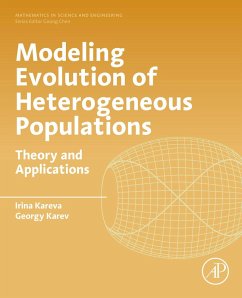- Introduces Hidden Keystone Variable (HKV) method, which allows modeling evolution of heterogenous populations, while reducing multi-dimensional selection systems to low-dimensional systems of differential equations
- Demonstrates that replicator dynamics is governed by the principle of maximal relative entropy that can be derived from the dynamics of selection systems instead of being postulated
- Discusses mechanisms behind models of both Darwinian and non-Darwinian selection
- Provides examples of applications to various fields, including cancer growth, global demography, population extinction, tragedy of the commons and resource sustainability, among others
- Helps inform differences in underlying mechanisms of population growth from experimental observations, taking one from experiment to theory and back
Dieser Download kann aus rechtlichen Gründen nur mit Rechnungsadresse in A, B, BG, CY, CZ, D, DK, EW, E, FIN, F, GR, HR, H, IRL, I, LT, L, LR, M, NL, PL, P, R, S, SLO, SK ausgeliefert werden.









